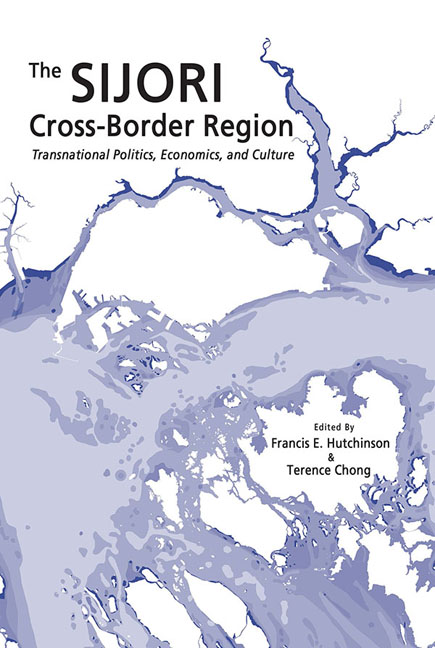Book contents
- Frontmatter
- Contents
- List of Maps
- List of Tables
- List of Figures
- Foreword
- Acknowledgements
- Contributors
- Abbreviations
- Introduction
- Section I Understanding the Whole
- Section II Policy and Politics
- Map3
- 4 The Social Construction of Comparative Advantage and the SIJORI Growth Triangle
- 5 The Political Economy of Closer Relations: A Perspective from Singapore
- 6 A Periphery Serving Three Cores: Balancing Local, National, and Cross-Border Interests in the Riau Islands
- 7 Political Contestation in Iskandar Malaysia: Views on Economic Integration during Malaysia's 13th General Election
- 8 Johor Survey: Interethnic Dissonance
- Section III Cross-Border Social and Cultural Communities
- Section IV Formal and Informal Economies
- Conclusion
- Appendix
- Sources for the SIJORI Maps
- Index
5 - The Political Economy of Closer Relations: A Perspective from Singapore
from Section II - Policy and Politics
Published online by Cambridge University Press: 22 July 2017
- Frontmatter
- Contents
- List of Maps
- List of Tables
- List of Figures
- Foreword
- Acknowledgements
- Contributors
- Abbreviations
- Introduction
- Section I Understanding the Whole
- Section II Policy and Politics
- Map3
- 4 The Social Construction of Comparative Advantage and the SIJORI Growth Triangle
- 5 The Political Economy of Closer Relations: A Perspective from Singapore
- 6 A Periphery Serving Three Cores: Balancing Local, National, and Cross-Border Interests in the Riau Islands
- 7 Political Contestation in Iskandar Malaysia: Views on Economic Integration during Malaysia's 13th General Election
- 8 Johor Survey: Interethnic Dissonance
- Section III Cross-Border Social and Cultural Communities
- Section IV Formal and Informal Economies
- Conclusion
- Appendix
- Sources for the SIJORI Maps
- Index
Summary
INTRODUCTION
The Singapore-Johor-Riau (SIJORI) Growth Triangle was first proposed on 20 December 1989 as an agreement between Singapore, Johor and the Riau Islands to exploit their geographical proximity and resource complementarity as a combined region. The idea behind the Growth Triangle was that Singapore's strengths in higher value manufacturing, world class infrastructure, financial resources and strong relationships with multinational companies (MNCs) would profitably complement Johor's and Riau's endowments in cheaper and more abundant land and labour. The development of SIJORI was to be led primarily by the private sector, with governments facilitating the flow of goods, services, investment and people. On 17 December 1994, this subregion was renamed the Indonesia-Malaysia-Singapore Growth Triangle (IMS-GT) and formalized with the signing of a Memorandum of Understanding.
In the SIJORI agreement, Singapore's dominance in the triangular partnership has been obvious and outsized — it has been the principal investor and major destination of trade flows. As costs in Singapore rise, the benefits of the agreement have become more telling. Yet, political issues remain a bugbear in further advancing this cooperation. Hence, as we discuss the merits of the SIJORI agreement, the main questions that must be answered are: Can Singapore become a global city like London or New York without having the immediate hinterland that those cities have? Can the three countries put aside their political differences for mutually beneficial growth? Can the Riau Island-Johor side of the triangle develop?
Currently, the factor endowments in the three regions differ. Singapore's strengths include its highly skilled labour force, well-developed infrastructure, and security and stability. However, it lacks land and other natural resources and its focus has thus been on high-value manufacturing and services. On the other hand, Johor and the Riau Islands both have an abundance of land and labour. Production is much cheaper than in Singapore but these two regions lack technology and capital inputs. Therefore, there may be potential synergies that could be unlocked in the agreement that would result in the region becoming competitive, productive and vibrant enough to compete with China. The advantages that we envision are: the re-allocation of land and labour for higher-value uses; increased scale and diversity; leveraging off each region's competitive advantage; and the benefits of increased competition.
- Type
- Chapter
- Information
- The SIJORI Cross-Border RegionTransnational Politics, Economics, and Culture, pp. 125 - 153Publisher: ISEAS–Yusof Ishak InstitutePrint publication year: 2016



